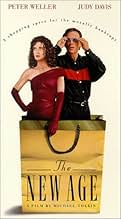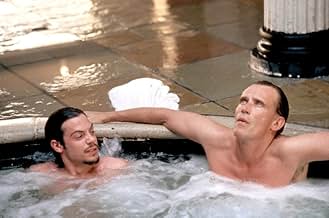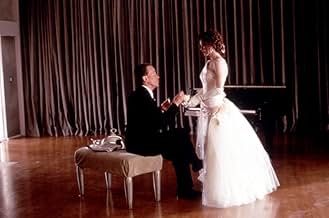AVALIAÇÃO DA IMDb
5,6/10
1,3 mil
SUA AVALIAÇÃO
Adicionar um enredo no seu idiomaEpisodic story about a yuppie couple who're going broke, and can't decide if they want to stay together - but openly sleep around and experiment with different lifestyles, or not.Episodic story about a yuppie couple who're going broke, and can't decide if they want to stay together - but openly sleep around and experiment with different lifestyles, or not.Episodic story about a yuppie couple who're going broke, and can't decide if they want to stay together - but openly sleep around and experiment with different lifestyles, or not.
- Prêmios
- 1 vitória no total
Avaliações em destaque
Writer-director Michael Tolkin, whose 1991 film "The Rapture" was one of the best films of its year, let his talents go to waste with this absurd comedy of lost morals. A graphic designer and her Hollywood honcho husband are in big financial trouble: she has no clients and he just quit his job. Some of their survival solutions are quirky and interesting, but the characters are off-base right from the start. Tolkin is the new Sidney Lumet: everyone screams irrationally at everyone else, but it's tough discerning whether or not we're supposed to laugh at these banal verbal matches, often from opposite ends of the swimming pool! The leads present another problem: Judy Davis and Peter Weller are brilliant actors, yet they can't work up any semblance of chemistry together as this high-powered married couple on a tightrope. A few of their marital predicaments are worked out amusingly (they separate within the house, and date others), but their jealousies and insecurities are a bore. Tolkin (also the screenwriter of "The Player") pretends to know these people (he's pseudo-hip). It would be to his ultimate advantage if he broadened his horizons...maybe it's time he left L. A. and make some new friends? *1/2 from ****
The response to this film was a little more negative than I expected. I liked the film better than Tolkin's "The Rapture." It's one of my favorites to watch for non-serious viewing.
The film has a quirkiness, even a spookiness, that, apparently, many dislike and don't understand. I wanted to recount the plot; however, since that's not desired, I don't see why other reviewers think the plot is so implausible.
Peter Weller's and Judy Davis' characters seem to be mismatched partners, but is that so implausible? This dissonance was probably intended, but disliked by many viewers. Anyway, the main characters compromise themselves in many ways: I think Peter and Judy do well in the movie.
I also like Adam West in his small part, and the under-rated Patrick Bachau plays his part as a new-age guru with urbane spookiness. Corbin Bernsen has a small part at the beginning as the boss for Peter Weller's character (Weller's character is conveniently named "Peter.")
Finally, I like the depictions of certain new-age ceremonies and personalities--this is rare in movies.... I think the movie is thoughtful. It does not have much action, but don't most action films today flagrantly violate the law of "suspension of disbelief?"
This film will not be liked by the multitude in America with the attention span of a gnat.
The film has a quirkiness, even a spookiness, that, apparently, many dislike and don't understand. I wanted to recount the plot; however, since that's not desired, I don't see why other reviewers think the plot is so implausible.
Peter Weller's and Judy Davis' characters seem to be mismatched partners, but is that so implausible? This dissonance was probably intended, but disliked by many viewers. Anyway, the main characters compromise themselves in many ways: I think Peter and Judy do well in the movie.
I also like Adam West in his small part, and the under-rated Patrick Bachau plays his part as a new-age guru with urbane spookiness. Corbin Bernsen has a small part at the beginning as the boss for Peter Weller's character (Weller's character is conveniently named "Peter.")
Finally, I like the depictions of certain new-age ceremonies and personalities--this is rare in movies.... I think the movie is thoughtful. It does not have much action, but don't most action films today flagrantly violate the law of "suspension of disbelief?"
This film will not be liked by the multitude in America with the attention span of a gnat.
Wealthy LA couple Peter and Katherine live comfortably, spending on credit and having affairs. When Peter quits his job as a recession looms the couple find that money is tighter and the values they hold dear mean nothing. Can they get in touch with themselves to navigate through their journey of life.
This film seems to be an attack on the yuppie culture in LA, with their materialism, their spiritualism and their aimless, work-shy lives. It seems this way for the most part but towards the end seems to say that we can all be happy if we accept who we are and confront it. It doesn't quite ride with me but the film up till this point is good - it's interesting and a bit moving to see the couple's relationship rise and fall with the difficult times. However once it falls back on spiritualism and the like it loses a lot of credibility.
Peter Weller and Judy Davis are both good in the leads, managing to display the correct amount of arrogance and emotion during the story. Adam West has a small role and is not great - is it just me or does everyone else still see Batman when they look at him. Samuel L. Jackson has a small cameo as a motivational salesman (like Alec Baldwin in Glengarry Glenross) and he shows off his trademark powerful performance - but he's not as good as Baldwin was (the material's fault).
Overall a good attack on materialism but the spiritual stuff doesn't work.
This film seems to be an attack on the yuppie culture in LA, with their materialism, their spiritualism and their aimless, work-shy lives. It seems this way for the most part but towards the end seems to say that we can all be happy if we accept who we are and confront it. It doesn't quite ride with me but the film up till this point is good - it's interesting and a bit moving to see the couple's relationship rise and fall with the difficult times. However once it falls back on spiritualism and the like it loses a lot of credibility.
Peter Weller and Judy Davis are both good in the leads, managing to display the correct amount of arrogance and emotion during the story. Adam West has a small role and is not great - is it just me or does everyone else still see Batman when they look at him. Samuel L. Jackson has a small cameo as a motivational salesman (like Alec Baldwin in Glengarry Glenross) and he shows off his trademark powerful performance - but he's not as good as Baldwin was (the material's fault).
Overall a good attack on materialism but the spiritual stuff doesn't work.
Critics seem to have split widely on this film, and it's easy to see why. It's a rather painful, plodding thing to sit through--yet one can't get it out of the mind afterward. Writer/director Tolkin has a lot of disturbing things to say about post-industrial affluence in America in the 1990s, and in trying to say everything in one movie he has piled it on so thick that the brain requires a postmortem to reflect. Judy Davis, as she was in "Husbands and Wives," is dynamite, and the film is worth seeing just for her. The film has an uncanny eye and feel for the bleak interiors of the contemporary American service economy: the boutiques, the high-rise telemarketing boiler rooms, the house-poor interiors of career people who are hardly ever at home, etc. The film's title refers to the spiritual quest of the couple to find a meaning to their existence, or at least some alternative approach to life to their destructive materialism. How they go about it is all wrong, of course. In true hedonist fashion, they try everything. At the same time they seek a simpler, spiritual, non-materialistic life via a bunch of wacky gurus and cultists, they are indulging in carnal and other pleasures as diversions. When they open a small business, ostensibly to gain more control over their lives and income, the forces of the world are worse than any bosses. In all of this, they seem to be outside of everything they do, as in dreams when you watch yourself and are powerless to control the changing scenery. Despite their doldrums and hostility, this is a couple who have too much in common to split. During the course of all this, Tolkin gets plenty of jabs in about an American economy that seems to be teetering on wisps of hope rather than on any true productivity. By the end, the "new age" looks uncomfortably like a very old one, in which the law of the jungle reigned.
This film was a complete surprise to me. It's clever, funny and very thought-provoking. Judy Davis and Peter Weller (that man is underrated) both deliver excellent performances. A warning: The ending isn't quite the usual happy salvation, but it really does hit the perfect note on one of the main themes of the film: You can't always get what you want. And pushing that very feeling to the viewer just before the credits is perhaps the cleverest thing about the whole film.
Você sabia?
- CuriosidadesWas #9 on Roger Ebert's list of the Best Films of 1994.
- Citações
Peter Witner: Did you know that in Chinese the word for "crisis" is the same as the word for "opportunity"?
- ConexõesFeatured in Siskel & Ebert & the Movies: Why Gump? Why Now? (1994)
Principais escolhas
Faça login para avaliar e ver a lista de recomendações personalizadas
- How long is The New Age?Fornecido pela Alexa
Detalhes
- Data de lançamento
- País de origem
- Idioma
- Também conhecido como
- The New Age
- Locações de filme
- Southern California, Califórnia, EUA(Location)
- Empresas de produção
- Consulte mais créditos da empresa na IMDbPro
Bilheteria
- Faturamento bruto nos EUA e Canadá
- US$ 245.217
- Fim de semana de estreia nos EUA e Canadá
- US$ 35.797
- 18 de set. de 1994
- Faturamento bruto mundial
- US$ 245.217
- Tempo de duração
- 1 h 52 min(112 min)
- Mixagem de som
- Proporção
- 1.85 : 1
Contribua para esta página
Sugerir uma alteração ou adicionar conteúdo ausente

























